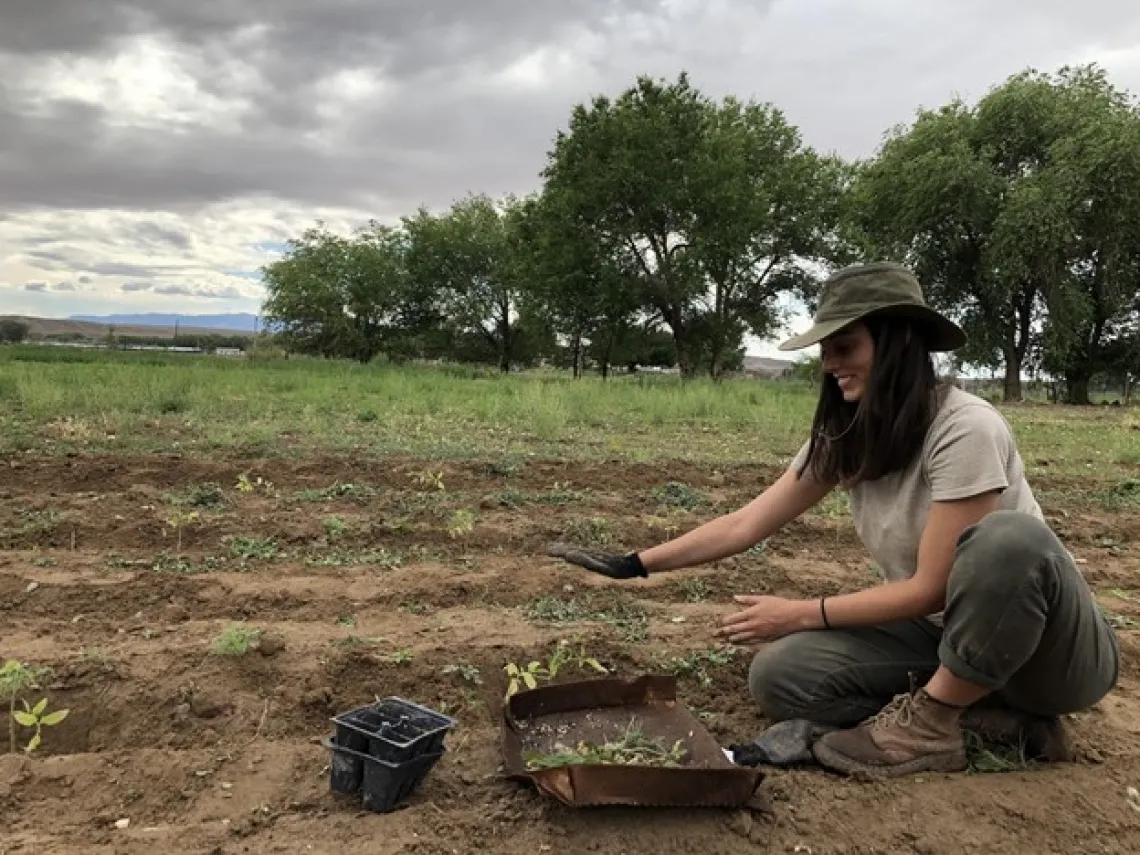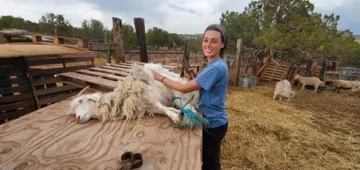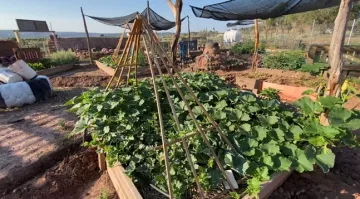Off-grid Summer Immersion Experience on the Navajo Nation: Trainee Alex Trahan

Alex Trahan
Alexandra “Alex” Trahan is currently an Indige-FEWSS trainee and is a second year Master’s student in the Department of Environmental Science at the University of Arizona. Alex is currently interning with Sixth World Solutions and immersed on the Navajo Nation this summer living without access to running water or easy access to food – this is her story.

Alex Trahan
Off-grid Summer Immersion of Indige-FEWSS Trainee on the Navajo Nation
My name is Alex Trahan and I want to share with you all about my internship with Sixth World Solutions this summer. Sixth World Solutions is a human rights organization that uplifts Indigenous communities through a place-based/solutions-oriented lens. Their areas of focus include food, energy, water, sustainable housing, as well as alliance and capacity building of the community leadership. The founders of Sixth World Solutions, Janene Yazzie (Diné) and Kern Collymore (Afro-Caribbean)are activists who have been working on the Navajo reservation for over a decade now. During this time, they continue to work for food, water, energy, and land sovereignty and security for the Diné community. Their work involves working with the local communities on the Navajo Nation and with Indigenous peoples abroad.
My internship with Sixth World Solutions has shown me a lot of action-based change instead of theorized change that I am used to. Community members come together to work for Indigenous rights, whether that be through training other Native Americans to live off-grid by facilitating workshops and/or by creating jobs. Some examples of this involvement include building an Earthship, implementing regional farming techniques in the community garden, and implementing off grid water filtration systems. I appreciate the ways in which Janene and Kern tackle obstacles from a holistic and thoroughly-balanced lens. Their vision is something I greatly admire as this is very hard to find in today’s job market.
One aspect of my internship that I enjoy most is that I am able to live on the reservation. In living here, I have to change my habits. I must be careful about the quality of my running water, know when and where I will haul my water from, conserve my hauled water for all household uses, taking care of my car that travels long distances on reservation roads, give time to run errands, and find an internet connection. I’ve learned about the Church Rock Uranium mill spill, the numerous abandoned uranium mines from the Cold Wars arms race, and the Gold King Mine Spill, but now I partially experience and witness these truths first hand for two months. My stay was transient and so I cannot speak for anyone who lives this reality daily. But I have noticed that there is a noticeable difference in my understanding when I am in this place, to learn, make relations, and begin to try and understand how another life would be with those lived experiences.
One of the projects that I was able to join was the food sovereignty initiative. During this project, I, along with other interns from Fort Lewis College, visit many of the farms, gardens, and homesteads throughout the reservation. While visiting these places, we were taught about different farming techniques and ways to truly listen, learn, and engage with the community members. We took all of these new methods back to our own community garden in Tsé Si Ani (Lupton), Arizona. Myself and other interns would curate these farming techniques into our garden spaces. An example of this was when we implemented a modified version of Bobby and Sunshine‘s composting bins which was an edited version of the Johnson/Su bioreactor composting done by James and Joyce Skeet at Spirit Farms. The Skeets taught us about the different ratios we needed to use in the thermal composting method that Owl McCabe, from the Work in Beauty’s Eco-Regenerative Learning Center, who went into further scientific detail while looking under a microscope. Additionally, another farmer in Leupp, AZ named Tyrone Thompson taught us about lasagna beds, shade houses, and how to pack a raised bed to retain moisture in the soil.

Alex Trahan
At Caroline’s (community member) home, we learned how to use a broadfork on hard compact ground to create soil conducive to growing plants. Then at the Greasewood Chapter house, we learned about the traditional method of putting an odd number of seeds into each hole in the soil and how this is important to the plant’s growth and maturation. While adding an odd number of corn kernels in each hole, we would plant the seeds, stand up, stretch our arms high into the air, and say “grow tall” so that corn stalk would know where it should grow. Then, for melon seeds, we planted the odd number of seeds crouched down in a crawling stance so that the melons will vine out and mimic our own movements as we set the intention of their future. At the farms by Shiprock, NM, Chili Yazzie told us his story, spoke about his interpretation of the roles of the four colors of people, and how to plant seedlings with tender loving care. Then at Beverly’s farm, we were taught how to space out, dig, prep, irrigate, and install support for tomato plants as other interns sheared a goat. On the next farm, we worked with Bobby who taught us about how bugs don’t like peppermint and how black ants love sunflowers. He also taught us the importance of the compost bins location within the garden area and how it is necessary to change their locations so the ground continues to stay fertile and maintains essential nutrients important for soil health. Lastly, the Skeets taught us that creating space for community members to congregate in the garden is very important by utilizing permaculture planting, decorative separators, shade cloths, chairs, benches, and cup holders. This welcoming environment allowed us to share stories and life lessons with each other during my internship this summer.
With the knowledge gained from community members, we are able to relay these techniques into our own community garden in Lupton, Arizona. This growing season, we have been able to plant tomatoes, melons, strawberries, flowers, peppers, mint, etc. in the garden. We also hung up bird houses, a bee hotel, and wind chimes. We set up irrigation lines (i.e. tubes, drip tape), a large tank for irrigation, fencing, hoop house organization and shelving, garden shades and seating, additional raised beds, created a to-do list of tasks and activities needed to sustain the garden, and we also created a seed bank that the community can access. By contributing to this project, we hope this will allow the Lupton community to make the garden their own with the knowledge they already have.
While working on the water projects with Sixth World Solutions, I linked up with Tolani Lake Enterprise and Tommy Rock to help communicate the results of a water sampling blitz taken at different water hauling locations on the Navajo reservation. I have been assisting with the creation of a water quality report that will show the results, in visuals, in order to inform each community about their water quality and safety. This water quality report will also be given to the chapter houses with the lab testing results attached so community members know what is present in their water sources that they haul water from.
Overall, this internship with Sixth World Solutions is what I hoped for the summer after a full year working in solitude during my first year in the southwest as a graduate student at the University of Arizona. The Indige-FEWSS traineeship continues to teach me about Indigenous rights, history, and facilitating partnerships in the Navajo community. I am very thankful to have been in the Lupton community with the new knowledge I gained this past year as an Indige-FEWSS trainee, and I am forever grateful for the lessons I have learned and continue to learn while in the program. I look forward to nurturing the friendships I made here this summer and continue collaborating with Sixth World Solutions in the future.
